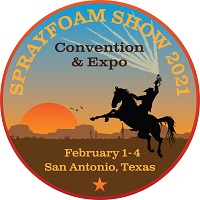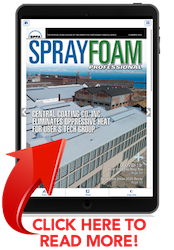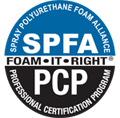|
We are looking for a few good men and women! The SPFA Board of Directors term is two years, which runs from July 1 to June 30. Beginning in May 2020 SPFA will be circulating nomination forms to membership for individuals to nominate or be nominated to have their name included in the 2020-2022 SPFA Board election process. The month of May allows for nominations of members interested in serving, and the month of June allows for actual voting in the election. The election closes at the end of June, and the new Board members will be announced on July 1, 2020.
|
February 1 – 4, 2021
Henry B. Gonzalez Convention Center, San Antonio, TX
The Sprayfoam Show 2021 is the largest annual convention and trade show dedicated to Spray Polyurethane Foam (SPF) in the United States. Bringing together industry participants in insulation, roofing, specialty applications, and related equipment, the event will span four full days and include educational sessions, a 65,000-square-foot exposition hall, professional certification programs, the annual Industry Excellence Awards luncheon ceremony, annual Golf Tournament, VIP events, and an entertainment-filled Close-Out Event Party. The event is expected to draw approximately 1,500 attendees from all regions of the United States and abroad. The sprayfoam industry grows domestically and internationally every year and The Sprayfoam Show is the signature event bringing together the sector’s professional community.
|

The construction industry added 464,000 net new jobs in May, the largest monthly increase in construction jobs since the government began tracking employment in 1939 and a drastic improvement from April, which recorded the industry’s largest month-over-month job loss.
|
Graco's new podcast, On Radio, features in-depth interviews with other sprayers and contractors, salespeople, vendors, distributors and more. It's commercial free; just an occasional plug for something new Graco is doing or to show support for the show guest. Guests will share their experience and insights on various topics.
On Radio's first three interviews are posted:
• Episode 1: Bill Bilben - The Making of a Spray Foam Industry Veteran
• Episode 2: Ken Wells - Be The Professional
• Episode 3: Patrick Mahoney - Paying it Forward
Coming soon...July 1 episode on Sales and Overcoming Price Objections.
|
The deadline for entries is June 30, 2020. We expect judging to be completed and winners notified by September 1. If you have questions about the awards or the entry process, please contact John Mesenbrink at jmesenbrink@cbmedia.us.com or by phone at (847) 359-6493.
|

Since the beginning of the pandemic, SPF contractors have reported shortages of respirators and cartridges. While N95 masks and cartridges have been in high demand, the P100 cartridges used in air purifying respirators have been in short supply for SPF installers. In addition, the availability of PVC coated coveralls (e.g., Tyvek suits) has been scarce. Many contractors have asked if the breathable non-woven coveralls may be used in place of coated coveralls. The best answer will come from your foam chemical supplier and may be found on the SDS.
In lieu of specific guidance from SPF manufacturers, here is what we know. Disposable PVC-coated suits provide the best protection against SPF chemical exposure. However, a 2017 study by Covestro (member log in www.sprayfoam.org/login for access) indicates that non-woven suits may provide adequate protection against airborne SPF chemicals during spraying but that PVC-coated suits should still be used when contact with liquid chemicals can occur during handing and equipment repair. This study does not constitute any recommendation or guidance from SPFA and may not prevent an OSHA citation, but contractors may want to consider this information when making clothing selection until the shortage of PVC-coated suits is resolved. It should also be noted that regular clothing should not be used for protection during spraying or chemical application because (1) the unknown level of protection from different fabrics and (2) the contaminated clothing should not be worn off the jobsite and should be discarded at the end of every shift.
Should you have any questions or comments, please contact Rick Duncan, SPFA Technical Director (rickduncan@sprayfoam.org) or the SPFA Safety Committee Co-Chairs, Brian Cote and Chris King.
Below is an example of guidance one SPFA member shared with their customers and us. None of this constitutes legal or health and safety advice, just observations during an unprecedented time and potentially helpful info intended to keep you as safe as possible.
Due to shortages cause by the COVID-19 pandemic, coveralls, (often referred to as Tyvek suits) used in many aspects of our trade are in short supply with long lead times. Below are some options to be used during these shortages. Working with the SPFA, ICAA, American Chemistry Council’s Center for the Polyurethanes Industry and our manufacturers, we have come up with some guidelines to help navigate through these times. Once the crisis is over and suits become available it may be prudent to replenish your supplies and build a stockpile to be prepared for a possible relapse. It is important to remember; these items have expirations dates so rotating stock may be necessary.
Coveralls come in many brands and many weights or thicknesses.
• Heavy, which is usually lined with a PVC material, is tough, lasts longer and is good when handing liquid chemical but is not very breathable. Best used when working with Spray Foam in crawl spaces, attics and wall assembles as well as around the liquid chemicals in the truck.
• Medium, which may have a small amount of PVC. This suit is much more breathable and is ok for small liquid chemical spills. It is often the preferred option for Spray Foam installers. It is used for attics, walls and minimal use around chemicals in the truck.
• Light, which is very breathable but will rip/tear easily. This is often used by Roofers, Waters Proofers, Fiberglass and Cellulose installers as well as some Spray Foam installers. With Spray Foam It is best used in areas where the installer is standing and does not require them to have any part of their torso come in contact with the ground. It is NOT Recommended for crawl spaces or attics because of its resistance to durability. If an installer is working on equipment, cleaning their gun or transferring chemical or drum pumps a chemical resistant apron with TYVEK sleeves MUST be worn in conjunction with the light weight suit.
Currently Heavy and Medium weight suits are very difficult to find. Lightweight suits are still available.
Recommendations
• If your location still has heavy/medium weight suits, save them for the Spray Foam installer to use in attics, crawlspaces and around the liquid chemical. If they use them around liquid chemical and do not get them dirty, have them wear them more than once. Suits should be hung up to dry and aired out after use. As soon as a suit is damaged it should be thrown away. Fiberglass, Cellulose, Roofers and Water Proofers should use lightweight suits.
• Ventilation is Mandatory and should always be used during spray foam application regardless of suit weight. If a lightweight suit is going to be used by a Spray Foam installer High Flow Ventilation fans MUST be used. Depending on the size of the work area, a minimum of one fan bringing air into the work area and one bringing air out of the work area should be used. (See Tech Corner Document Attached). Open windows and low flow house fans are not considered adequate ventilation.
• It is a good practice when wearing a medium weight suit and mandatory when wearing a lightweight suit to wear a chemical resistant apron and Tyvek sleeves when working with raw chemical. This would include, working on equipment such as hoses, reactor, drum pumps and guns as well as transferring chemical from one drum to another or transferring drum pumps from on drum to another.
• There should never be exposed skin when wearing a chemical suit and working with spray foam.
Examples of suits for MDI exposure provided by the American Chemical Council here: https://www.spraypolyurethane.org/personal-protective-equipment-ppe/#protective-clothing
Please reach out to your risk manager if you have further questions.
For further guidance, please visit SPFA.
|
Working safely during COVID-19 is a challenge. While the SPF industry already complies with some of the most demanding H+S requirements on a jobsite, risks still remain to the workers of our industry during everyday tasks, travel to and from a jobsite, etc. SPFA offers some reminders to keep your safety simple and doable in this infographic.
|
- Apex Building Company, LLC – Milan, TN
- Green Energy Builders & Solutions by Arch Constructions – Jacksonville, FL
- Mastersson Roofing & Spray Foam LLC – Temple, TX
- Primeaux Associates LLC – Elgin, TX
|
Not an ideal situation, but an unscheduled or unexpected shut-down of a rig can happen. If it does, this is one more quick resource available to the SPF industry from the members of SPFA to preserve your equipment. Download it today.
|
The 2020-2021 edition of the SPFA Membership Directory and Buyer’s Guide is being prepared for print! We recognize SPFA Member Companies who employ certified individuals in the Directory. PCP Accredited Contractor Member Companies have their customized Accreditation Mark with complete contact information and searchable data to make them really stand out in the directory. All Accredited Companies, regardless of membership status, are listed on the Accreditation page. There is still time for you to join this prestigious list! Contact certdirector@sprayfoam.org to get started!
|
All seven PCP Exam Prep Courses are available for FREE to SPFA Members and companies with employee enrolled in PCP. (Each course is valued at $250). If you are eligible for FREE access, you were sent information on how to access the courses. If you didn’t receive, contact certdirector@sprayfoam.org. For those who don’t fall into either category but are interested, all you need to do is enroll in PCP using this form and you can access all courses and receive the study guides for FREE! (Study Guides are valued at $50/each.)
|
SPFA is doing its part to bring awareness of open positions in the industry to our members, partners, and untapped talent pools. For every one of these positions going unfilled it’s an opportunity missed, an extra staffing challenge drawing attention away from other important priorities, or a customer perhaps needing to wait longer than they should have to.
|
The order effectively does away with the responsibility for federal agencies to abide by regulations established by laws like the National Environmental Policy Act, the Endangered Species Act and the Clean Water Act in order to speed up public works projects that will create jobs. Without intervention, according to the order, the United States faces "the likelihood of a potentially protracted economic recovery with persistent high unemployment."
|

Roofing is one of the several “essential” construction industries continuing to operate during COVID-19. The roof is a first line of defense against weather, damage, and even potential displacement of occupants during this period of isolation. It is also one of the industries most impacted by the workforce shortage in recent years. Roofing construction is coming back, along with it the early-demand for workers. The benefit of natural trades-distancing on a roofing jobsite, and capitalizing upon a recent trend in remote-inspections, SPFA is a supporting member of a multi-product roofing industry coalition consisting of the leading trade associations from that market trying to advance the return of the industry. Putting the playbook together for getting the SPF roofing, and insulation, industries back to work in the recovery is the highest priority for SPFA.
|
If like many of us, you have been bouncing around from one source of information to the next, SPFA has attempted to curate for you an assembly of the best related information that should assist your sprayfoam business during these challenging times. Check back often as information is quickly changing.
|
NRCA provides guidance and information on several issues involving Covid-19 to assist in managing business through the crisis. This includes best practices for prevention; links to authoritative information from the Centers for Disease Control, World Health Organization and Occupational Safety and Health Administration; legal resources, including key contract provisions; insurance resources; federal financial assistance; employers’ and employees’ rights; and more.
|

|
| |
|










